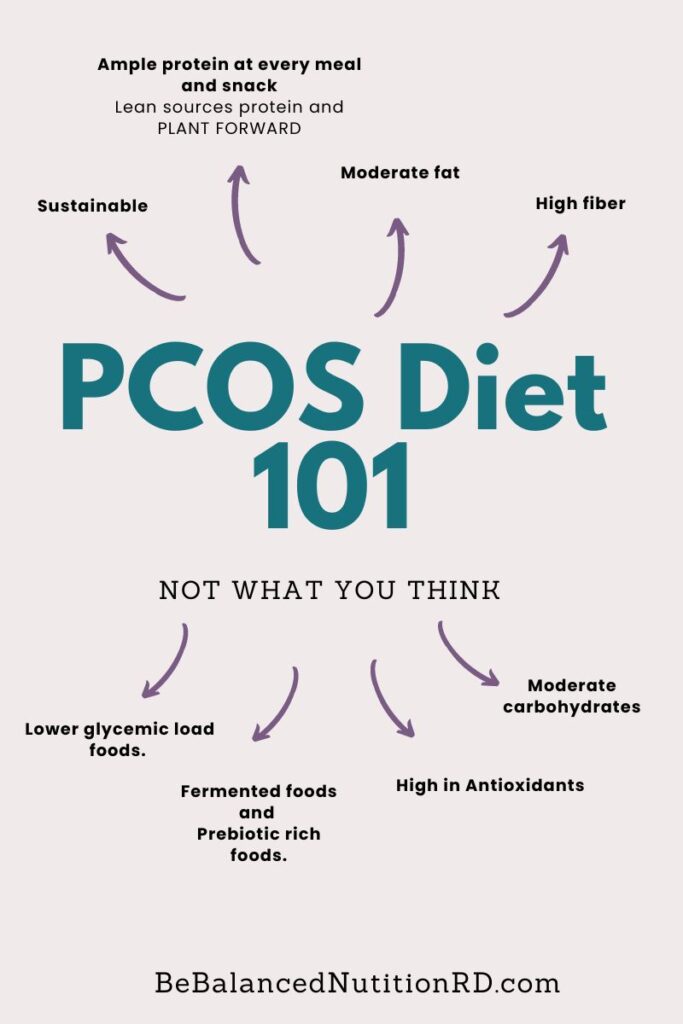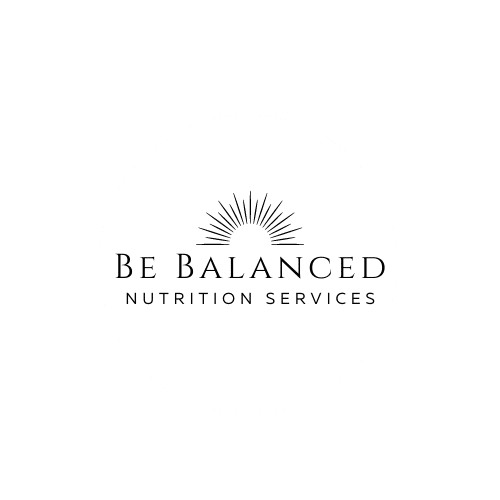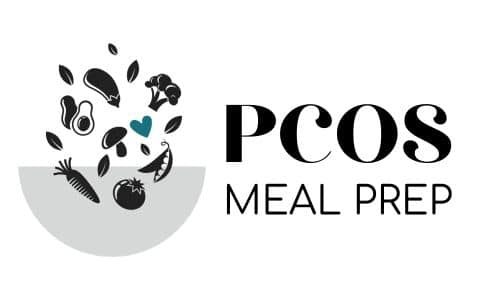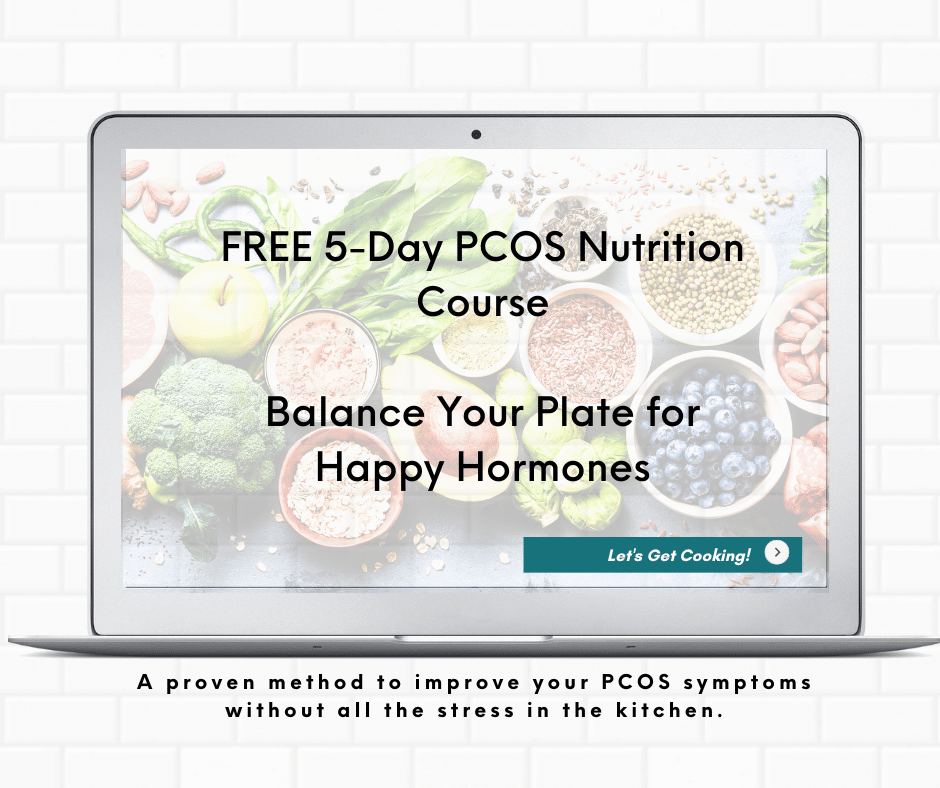Confused about what to eat for PCOS? Do you just need a little guidance to get you started with planning your own healthy, delicious and PCOS-healing meals?
This free 7 Day PCOS diet plan pdf is aimed at stabilizing blood sugar levels, improving insulin resistance to help manage PCOS symptoms including maintaining a healthy weight for your body. It will also help with normalizing hormones and reducing inflammation associated with PCOS and many chronic diseases.
The PCOS recipes in this PCOS meal plan is extensively tested and features whole food ingredients with easy-to-follow directions for people of all cooking levels.
This PCOS diet plan pdf includes recipes for breakfast, lunch, snacks, and dinner as well as a grocery list to make shopping a snap.
Now, if you’re wanting to learn more about a healthy diet for PCOS, why it matters, what to eat and what to avoid, check out the rest of this post.
And since I’m a Registered Dietitian Nutritionist specializing in PCOS and culinary nutrition I’ll also show you how to plan a healthy PCOS meal.
Table of contents
- What is Polycystic Ovary Syndrome?
- How does your diet impact PCOS?
- Best diet for PCOS?
- PCOS Diet 101- The Basics
- PCOS Foods to Eat
- Foods to Avoid in PCOS
- How a meal plan can improve your PCOS?
- How-to meal plan for PCOS?
- Download your 7-Day PCOS Meal Plan!
- Do I have to spend all day Sunday “meal prepping” to improve my PCOS?
- Final thoughts…
What is Polycystic Ovary Syndrome?
Polycystic ovary syndrome (PCOS) is the most common endocrine and metabolic disorder of women of child bearing age and the most common cause of infertility. It’s estimated that 1 in 10 women have PCOS, so while it is a very common health condition it can have serious health effects. (2)
Women with PCOS are at increased risk for diabetes, cardiovascular disease, stroke, high blood pressure, high cholesterol, non-alcoholic fatty liver disease, metabolic syndrome and other health conditions.
PCOS is an endocrine condition characterized by high male hormone (androgren) level.. This hormonal imbalance can cause polycystic appearing ovaries, irregular periods, infertility, excess hair growth, acne and hair loss. (2)
Other common symptoms are (2):
- weight gain
- trouble with weight loss
- GI issues
- fatigue
- anxiety/depression
- carbohydrate cravings
- hair growth
- hair loss
- sleep disturbances
From my practice as a registered dietitian nutritionist, serving women with PCOS, I also see a lot of clients with disordered eating patterns or eating disorders. Research also shows the having PCOS increases risk for an eating disorder by 3-6 fold. (3)
How does your diet impact PCOS?
Your diet can have a significant impact on your PCOS symptoms and reducing risk for future chronic conditions like diabetes or heart disease. (4)
When you choose a dietary pattern that address insulin resistance, decreases inflammation and improves gut health, PCOS symptoms including weight gain, infertility, insulin resistance, carb cravings, and hair growth can be managed.
Nutrition and lifestyle changes continued to be considered the first line approach in managing PCOS.
Best Diet for PCOS?
That is the million dollar question.
The newest recommendations from the 2023 International Evidence-Based Guideline for the Assessment and Management of Polycystic Ovary Syndrome, states that there is no “best diet for PCOS” with the current research available. (5)
The newest PCOS treatment guidelines as of 2023 also state that any diet composition consistent with population guidelines for healthy eating will have health benefits. They specifically mention the DASH diet and the Mediterranean diet. (5)
Another important factor in the dietary intervention portion of guidelines is that a PCOS diet plan should be tailored for an individuals food preferences, considering cultural or religious food preferences. This allows for a flexible approach that will help someone manage habits and promote optimal health and wellbeing. (5)
It also specifically advices to avoid unnecessarily restrictive and nutritionally unbalanced diets, just as it is for the general population. (5) Yep, so you don’t need to follow a gluten free, dairy free diet for PCOS as there isn’t any evidenced to support it.
What the new guidelines (and what dietitians have been promoting for years 😁) do say it that instead of restricting carbs, focus on the quality of the carbohydrate rich foods and include carbs that are high in fiber with a lower glycemic index like whole grains, beans, legumes and fruit.
Research shows that high fiber, lower glycemic index carbs reduce risk of cardiovascular disease risk and are associated with weight loss, lower risk for diabetes and cardiovascular disease. (6, 7).
I think it’s important to mention the mediterranean diet pattern is as associated with improved metabolic health, which is critical for improving PCOS symptoms and prevent chronic diseases. (8)
Your free PCOS meal plan (download pdf below) will help you take all the science and put it into action in the kitchen.
PCOS Diet for Weight Loss?
Again, the billion dollar question.
There is research that shows weight loss in individual with a very low calorie diet (9), ketogenic diet (10, 11) and intermittent fasting (12, 13, 14).
HOWEVER, there are limitations to this research. These studies have a limited number of participates, have a high drop out rate (indicating that following the restrictive diet was difficult) and are for a short time period. None of them report results from a long-term follow up.
Most of these studies also report weight loss in the control groups as well, just not as significant as the intervention groups.
The very low calorie diet research study mentions a noted side affect for participates being gastrointestinal issues like constipation, bloating, and minor abdominal discomfort at some point during the eight weeks. It resolved with fiber supplements. (9)
The current 2023 International Evidenced-Based Guidelines for the Management and Assessment for PCOS did not indicate any high quality research or data suggesting the use of a very low calorie, ketogenic diet or intermittent fasting for long term management of PCOS and weight.
10 Lifestyle Changes to Help Improve PCOS
It’s important to note that managing PCOS symptoms takes a whole person approach. You can’t ignore other aspects of health like sleep or stress management.
- Get regular exercise.
- Get adequate sleep (7-9 hours).
- Manage stress.
- Choose drinks wisely.
- Enjoy fun foods.
- Choose heart-healthy fats.
- Set goals.
- Eat mostly plants.
- Avoid diets.
PCOS Diet 101- The Basics
Okay, you may be asking, then would should I eat? Lets take a look at the types of foods we should be focusing on when trying to manage our PCOS symptoms and/or trying to lose weight.

- Sustainable. A super restrictive diet isn’t going to work in the long term. You know what I’m talking about. You need to find a sustainable dietary pattern that will improve your PCOS AND you can continue for the rest of your life.
- High fiber. Fiber helps with blood sugar regulation, helps keep you full and satisfied, improves gut health which will help lower inflammation, digestion and gut microbiome diversity.
- Fruits, veggies, whole grains, beans/legumes, nuts/seeds
- Lower glycemic load foods Foods that are lower glycemic index/load have less of an effect blood sugar
- Whole grains, starchy veggies, fruits and veggies, beans/legumes
- Fermented foods and Prebiotic rich foods
- probiotics like yogurt, kefir, kimchi, sauerkraut, Prebiotics like onions, banana, garlic, chicory root
- Moderate carbohydrates (approximately 40-50% of calories or less)
- Ample protein at every meal and snack
- Lean sources protein and PLANT FORWARD– Nuts/seeds, beans/legumes including whole soy at least 3 x week, fish/seafood several times per week, poultry, meat.
- Moderate fat (approximately 30-40% of calories) Mono and Polyunsaturated fats
- Omega 3s, olive oil, nuts/seeds like flax seeds, chia seeds, hemp seeds, avocado.
- Antioxidants from fruits, vegetables, whole grains and herbs and spices
PCOS Foods to Eat
Trying to figure out what foods you should be eating for PCOS can feel overwhelming.
We don’t have to complicate things when it comes to a PCOS friendly diet. Focusing on fruits, vegetables, whole grains, nuts/seeds, beans/legumes, herbs/spices, lean proteins including seafood and plant based proteins, is a great start.
To break this down even further, check out this article PCOS Food List for more specifics.
Plus, don’t forget that this free PCOS meal plan will help you make sense of this list of foods for PCOS and show you how to make healthy PCOS meals.
Foods to Avoid in PCOS
Foods to avoid in PCOS are going to be ones that make the root drivers of PCOS worse.
Managing insulin resistance, decreasing inflammation, adrenal dysfunction and improving gut health are the keys to addressing hormonal imbalances and symptoms in PCOS.
The article discuss the PCOS food list in depth, but here are some of the foods to avoid, or realistically just limit.
- High glycemic index foods
- Simple carbohydrates like candy, sugary foods like cookies, ice cream, ect
- Refined carbohydrates like white bread, white rice, low fiber cereals, bagels
- Fast food, especially fried foods like french fries, doughnuts
- Processed meats like bacon, canned sausages, some deli meats
- Highly processed packaged foods like ramen, boxed meals canned pasta or pizza rolls
- Unhealthy fats like saturated fats (any fat solid a room temperature) and trans-fat (usually in commercially fried foods or shelf stable baked goods) which can also increase risk of heart disease
- Restaurant and food truck foods
- Low fiber meals
I think it’s important to mention that you don’t have to give up all these for forever. We aren’t going to give up sugar for the rest of our lives, but it’s important to be mindful of where it comes from and how much we can consuming each day.
How can a PCOS meal plan improve your PCOS?
Sets you up for success
- When you have a simple, realistic meal plan for meals and snacks each week, you are more likely to get nourishing meals on the table without stress.
- By having snacks planned you will avoid afternoon trips to the coffee shop and you won’t come home ravenous. No one wants to cook dinner when they are starving, you just want to get takeout.
Saves you time and money
- Having a meal plan saves you time on deciding what to eat or having to pick up last minute ingredients. You also save money by having a list of what you actually need to purchase.
- You can plan meals around similar ingredients so things don’t go to waste. Need carrots and celery for soup? Roast carrots for a side dish and add celery to your salad for extra crunch!
Improve your diet quality (this is really important for PCOS)
- Several studies have shown that people who use meal plans tend to follow dietary guidelines more closely, eat a wider variety of foods, and consume more fruits and vegetables.
- Focusing on improving diet quality (more fiber, fruits, veggies, whole grains, beans, omega-3s) is one of the best strategies for improving PCOS. (6)
Maintain a desired weight (that is right for you!)
- Studies show that people who use meal plans are less likely to experience obesity than those who don’t. How? Because meal plans can give you control of your ingredients, cooking methods, and portion sizes.
How-to meal plan for PCOS?
Here are a few key things to remember when planning meals for PCOS:
- Create a plate that balances blood sugars with a combination of complex carbs, protein, fat and fiber at meals which will help improve insulin resistance and reduce testerone levels
- Add lots of fiber to improve gut health and keep yourself full
- Choose antioxidant rich foods (think whole grains and colorful fruits and veggies) which will help improve PCOS
This is the “formula” I use for myself and my clients. It’s an easy way to portion your plate and hit all those key factors, without having to count calories or carbs.
- ½ plate non-starchy veggies ( or ¼ veggies, ¼ fruit)
- ¼ plate complex carbs
- ¼ plate protein (animal or plant based)
- Source of healthy fat at the meal like olive oil on veggies, nuts or seeds sprinkled on veggies or protein, avocado, ect.
Download your Free 7-Day PCOS Meal Plan PDF!
Do I have to spend all day Sunday “meal prepping” to improve my PCOS?
Meal planning doesn’t mean having to spend all day on Sunday meal prepping.
Meal planning is spending time each week writing down what meal and snacks you will have over the next few days/week. Then shopping for that food so you are ready to make meals and snacks easily.
If you need help with meal planning and staying accountable each week in prepping or cooking meals, check out the PCOS Meal Prep Membership.
Final thoughts…
In my experience working with individuals with PCOS some sort of meal planning is key to a client’s success. I also have PCOS and I have learned that even a basic weekly meal plan is critical to helping to control my PCOS symptoms.
When you boil it all down, we all get busy, traffic happens, horrible days at work happen, whatever. If you have a simple, realistic meal plan for that week, then you are more likely going to be able to still get nourishing meals on the table without stress.
Want to improve your confidence in the kitchen? Or get PCOS meals on the table with all the stress in the kitchen? Need accountability to stay on track with your weekly goals? Or access to my simple meal planning software with >1,000 recipes to choose from? Then the PCOS Meal Prep Membership is perfect for you!
More articles you might like…





Thank You
You are welcome! I hope you found the article helpful!